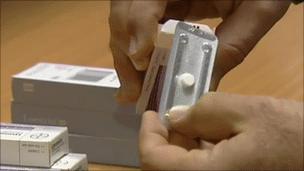Morning-after pill made free at pharmacies in Wales
- Published

Emergency contraception can now be obtained without charge from pharmacies across Wales.
Community pharmacists in Wales can also give the "morning-after pill" to under-16s, if clinically appropriate - a move that has angered campaigners.
Some GPs have warned about "missed opportunities" to educate young women about sexually transmitted diseases.
Ministers said pharmacists had a vital role in reducing unwanted pregnancies.
Parts of Wales have some of the highest teenage pregnancy rates in the UK.
Health minister Edwina Hart announced the move last November, saying she wanted professional advice available without appointment and "easily accessible within the 72-hour time span necessary for emergency contraception to be most effective".
The morning-after pill is free to women in England if it is prescribed by a GP or family planning clinic.
The change will affect 700 pharmacies, with the new system being rolled out from 1 April.
The Royal Pharmaceutical Society (RPS) said the change would mean the emergency contraception would still only be available in about 50% of pharmacies in Wales for the time being.
"It's not happening overnight that emergency contraception is instantly available; currently around 50% of local health boards are funding for it in their area," said a spokeswoman.
The RPS said free emergency contraception had been available to over 13s in community pharmacies in Scotland since 2008, under contracts negotiated with pharmacists there.
The scheme in Wales will eventually be rolled out to all pharmacies, including High Street chains and those in supermarkets.
The pill will be allowed to be dispensed to under-16s if pharmacists decide if it is clinically appropriate to dispense it and if the girl requesting the pill understands what she is asking for.
But Josephine Quintavalle, founder of Comment on Reproductive Ethics (Core), said it would encourage "irresponsible" attitudes to sex.
She told BBC Wales: "It's absolutely the wrong way to address the problems of high rates of teenage pregnancy in Wales. The idea that young girls can just walk into a chemist will mean they become even less responsible about sexuality.
'Know the dangers'
"I don't see how any chemist can stop a 12-year-old taking the morning-after pill, some 12-year-olds do look like 16-year-olds these days."
Dr Marina Arulanandam, of the Llandaff Surgery in Cardiff, said GPs and family planning clinics had a vital role to play in educating women about a whole range of issues like sexual health, ectopic pregnancies and possible side-effects of taking the medication.
She said: "It's important young people know the dangers of unprotected intercourse.
"It's not just pregnancy they should worry about, it's STDs [sexually transmitted diseases] - these are huge problems we need to be addressing and I don't think the pharmacies will have enough time to do this."
Community Pharmacy Wales said only fully qualified and trained pharmacists would be delivering the service in pharmacies and not any of the other staff.
It said patients would be seen in private consultation rooms available in nearly all of the 707 community pharmacies in Wales.
And it said the service was part of the assembly government's sexual health action plan aiming to reduce teenage pregnancies further and improve sexual health.
Chairman Ian Cowan said the service as it already exists made a "massive difference to women's lives" and was "immensely reassuring to the women who need it".
The Society for the Protection of Unborn Children (Spuc) said it "promotes promiscuity, and undermines public health" and could have an adverse effect on young and vulnerable women.
However, the move has been welcomed by family planning charity Marie Stopes International.
'Different types'
Clinical development director Dr Paula Franklin said: "Contraceptive choices are equally the responsibility of men and women and everyone should choose a method that best suits them.
"Many people do not realise that there are 16 different types of contraception available to choose from, LARC or long-acting reversible contraception are the most effective forms of contraception available.
"People should still feel that if they are unsure of the options available to them that they can speak with their GP or with counsellors through an independent organisation such as Marie Stopes International."
- Published1 April 2011
- Published22 February 2011
- Published14 December 2010